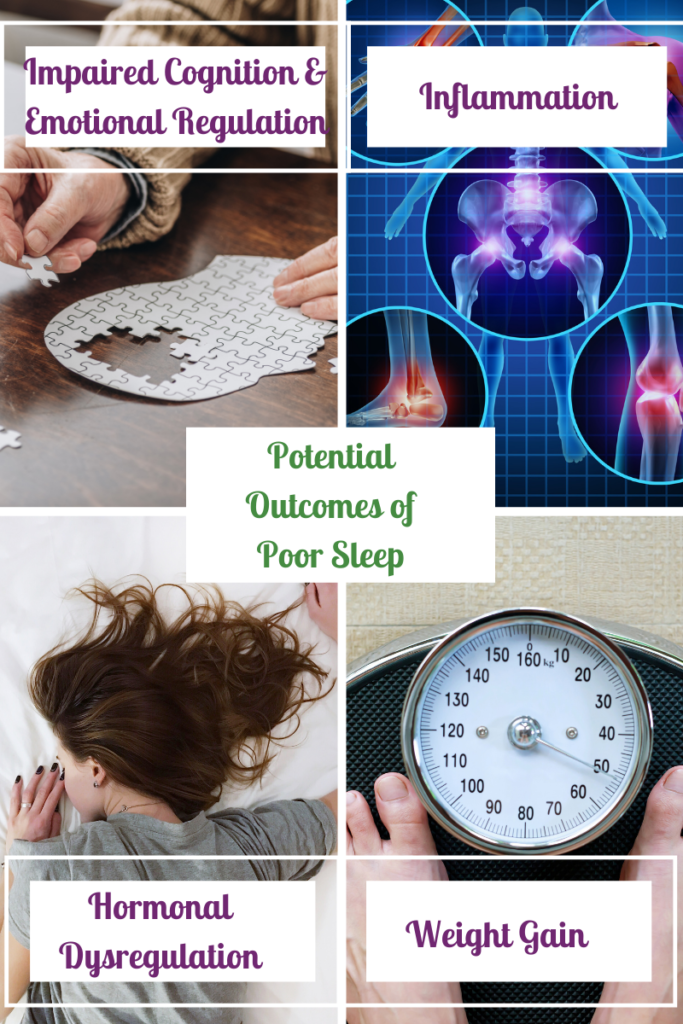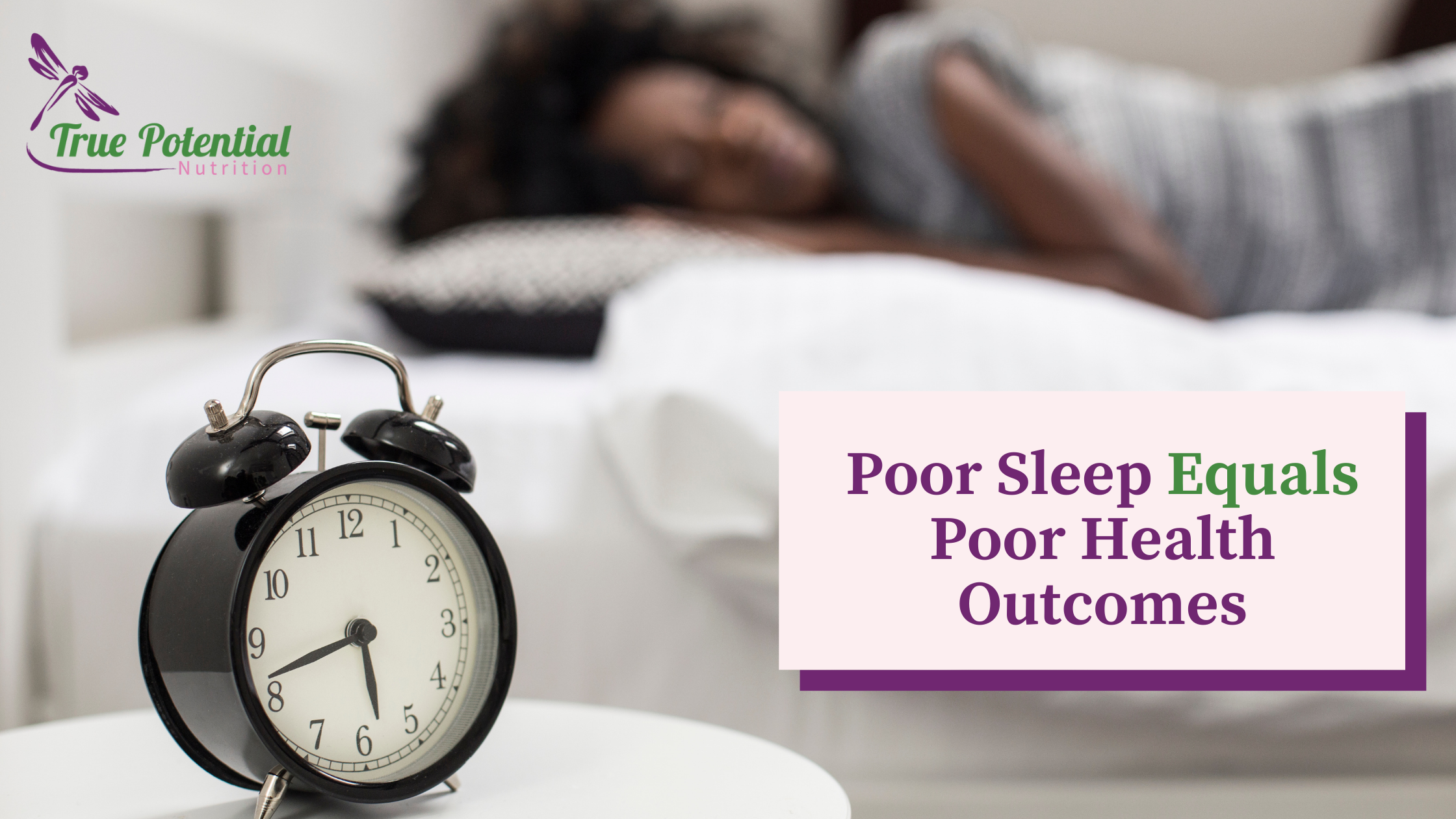By Danielle MacDowell

Main Takeaways
- When sleep is deprived, even for short periods of time, cognitive performance and emotional management begins to deteriorate.
- Research has demonstrated that the duration people sleep and the number of times people wake up throughout the night is associated with inflammation risk.
- Between 7-9 hours is the sleep “sweet spot.”
- Too much sleep and too little sleep can have a negative impact on one’s health.
- Inadequate sleep can result in abnormal metabolism, thyroid stimulation, hunger and satiety cues, and an atypical stress response.
- Sleep deprivation makes it more difficult to sustain a healthy weight.
- When our bodies and brains aren’t fully rested, people often crave energy-dense foods. It is important to opt for balanced snacks and meals during these times.
- There are several sleep hygiene tactics we can employ, but we have to be dedicated to the process.
Table of Contents
Sleep. We all need it, yet many of us are fighting to get enough of it. With the everyday demands and stressors we are continuously confronted with, it can be hard to peacefully rest our heads on our pillows at night for a good night of rest.
If any of the above resonates with you, you are in good company.
Approximately 25% of the United States population have insomnia-related complaints.[1] With ¼ of our nation getting inadequate sleep, there is serious cause for concern, as lack of sleep is related to all-cause mortality, increased risk of infection, and increased susceptibility to chronic inflammatory disease.[1]
Not only does inadequate sleep put an individual’s overall health in jeopardy, it can also greatly impair a person’s quality of life, cognitive performance, and emotional wellbeing.
Sleep, Cognition, and Emotional Regulation
Sleep is a programmed time for us to filter, solidify, consolidate memories. [2] It is needed for optimal cognitive and physical performance, vigilance, attention,and emotional regulation. When sleep is deprived, even for short periods of time, cognitive performance and emotional management begins to deteriorate.
Sleep and Inflammation
In spite of its reputation, inflammation, when regulated, is actually a good thing for our body.
In small doses, inflammation provides our body with a “system of information flow” that can be used to address acute illness and injury as well as assist in the body’s recovery and regeneration processes.[3]
In a healthy individual, these inflammatory mechanisms occur at a rapid rate and in a controlled fashion.
Just like our government, the body has its own set of checks and balances that help keep inflammation under control. However, when these checks and balance systems become unbalanced, the body loses its ability to properly manage inflammation. This is when health problems arise.
When inflammation occurs over a long period of time or becomes more than the body can manage, diseases, such as cardiovascular disease, allergies, cancer, type 2 diabetes, and arthritis, can occur. [3]
For the above reasons, keeping these inflammatory responses in check is critical for one’s health. While there are a number of lifestyle changes that can be made, sleep is an important part of this puzzle, as sleep directly impacts inflammation. [1]
When looking at 72 studies analyzing 5,000 patients, researchers found that both the length of time people slept and the number of times they awoke throughout the night increased inflammation.1Interestingly, the individuals who slept too long and who did not stay asleep ended up with the highest inflammatory markers. [1] At this time, the evidence between the association of shortened sleep times and inflammation is inconclusive.[4]
To quickly summarize this research, when looking at sleep health and its impact on inflammation, we have to consider how to get to sleep and stay asleep (but not for too long).
Sleep and Weight Gain
Added inflammation, emotional dysregulation, and poor cognitive performance are not the only thing that the body is susceptible to when someone is in a sleep deficient state. When sleep is inhibited, hormonal dysregulation, such abnormal production of thyrotropin, leptin, ghrelin and cortisol can occur. [5]
Due to these hormonal alterations, inadequate sleep can result in abnormal metabolism, thyroid stimulation, hunger and satiety cues, and an atypical stress response.
In isolation, any one of these hormonal changes can contribute to weight gain. So, when an individual is hit with several of these changes simultaneously, it becomes exponentially harder to sustain a healthy weight.
As if the hormonal disturbances are not enough to contend with, the decrease in sleep can also increase the bodies’ desire for high carbohydrate foods for fuel. [5] This is because sleep deprivation essentially primes the body to seek out calorically dense foods to compensate for the lack of energy restoration.

Snackin’ After a Poor Night’s Rest
When our bodies and brains aren’t fully rested, people often crave energy-dense foods. This is because these types of foods provide the body with a quick “pick me up” after a poor night’s rest.
While it is tempting to reach for the carb-rich snack, it is best to opt for a balanced snack, like a handful of nuts or a turkey roll-up with avocado. Eating something with a nice blend of carbohydrates, proten, and fat will give your body the energy it needs while avoiding the blood sugar spikes.
Remember what comes up must come down. Same is true for our energy levels.
When our energy levels spike, they plummet just as precipitously. Choosing a balanced snack will help you achieve sustained energy while avoiding extreme energy highs and lows. This is important for short-term well-being and long-term health.
How to Change Sleep Patterns
We now know the damaging effects that lack of sleep can have on all aspects of our health; and I am sure you are thinking to yourself, how do I actually improve my sleep?
Fortunately, there are a number of strategies to improve our sleep patterns. These strategies are known as sleep hygiene.
Sleep hygiene encompasses the positive practices that we put into place to restore our sleep.
And while many of these strategies are simple, they are not always easy to employ. The saying “simple not easy” comes to mind. It is going to take time and commitment to change your normal bedtime routine until these practices become a habit.
Know that these changes are going to take time.
Commit to it.
Be in it for the long haul because you and your health are worth it.
Quick Tips on How to Get a Good Night Sleep Tonight
- Maintain a consistent bedtime and wake up time
- Avoid nighttime workouts
- Avoid napping
- Stop drinking caffeine after 12:00, as caffeine stays in your system for hours after consumption.
- Avoid Alcohol
- Reduce blue light exposure
- Remove screens from the bedroom
- Stop looking at blue light at least an hour before bedtime.
- Purchase blue light blockers if screen time cannot be avoided.
- Avoid anything that is going to be overly exciting and compete for your attention before bed (e.g. your favorite television series)
- Limit fluid intake before bed to reduce bathroom trips
- Go to the bathroom before bed.
- Eat a small 150-200 calorie snack.
- Black out the room. This can be done with some reasonably priced curtains. Thanks online shopping!
- Declutter the bedroom. The bedroom needs to be a sanctuary and anything unrelated to sleep and intimacy should be taken out of the bedroom.
- Adopt personalized stress-reduction routines (e.g. yoga, meditation, nighttime herbal teas, journaling, etc.). Journaling can be especially helpful for anyone with a high stress load.
Final Thoughts and Main Takeaways
Poor sleep contributes to poor health outcomes. Both shortened duration of sleep and fractured sleep can impact one’s health. So, the goal is to not only increase the duration of sleep to meet the recommended 7-9 hours, but also to decrease the number of times someone wakes up throughout the night.
- Irwin MR, Olmstead R, Carroll JE. Sleep Disturbance, Sleep Duration, and Inflammation: A Systematic Review and Meta-Analysis of Cohort Studies and Experimental Sleep Deprivation. Biol Psychiatry. 2016;80(1):40-52. doi:10.1016/j.biopsych.2015.05.014
- Eugene AR, Masiak J. The Neuroprotective Aspects of Sleep. MEDtube Sci. 2015;3(1):35-40.
- Pizzorno, J. & Katzinger, J. (2012). Clinical Pathophysiology: A Functional Perspective. Coquitlam, British Columbia: Mind Publishing.
- Mullington JM, Simpson NS, Meier-Ewert HK, Haack M. Sleep loss and inflammation. Best Pract Res Clin Endocrinol Metab. 2010;24(5):775-784. doi:10.1016/j.beem.2010.08.014
- Kim TW, Jeong JH, Hong SC. The impact of sleep and circadian disturbance on hormones and metabolism. Int J Endocrinol. 2015;2015:591729. doi:10.1155/2015/591729





